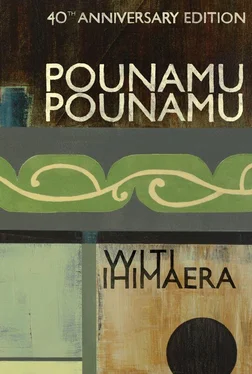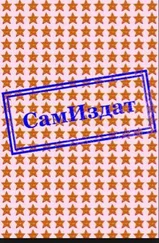The curtain falls across Jimmy’s window. And suddenly, Sally thinks: Could it have been Jimmy? No, it couldn’t possibly have been him. It couldn’t possibly have been any of the children! But then who could it have been? Who?
Thoughtfully, Sally Simmons prepares the tea. She hears the back door of the Heremaia house twang open. Jack is returning. Quickly, she gets two cups and saucers from the cupboard and begins to pour the tea. The door opens behind her. She turns and kisses her husband.
‘Oh, Jack,’ she sighs. ‘I think it could have been Jimmy.’
‘Jimmy?’
Sally Simmons nods. ‘Who else could it have been?’
Her husband shakes his head. ‘Perhaps it was the same person who stole the goldfish.’
‘Oh no,’ Sally says. ‘Do you really think someone else is doing all this?’
‘I just don’t know what to think any more.’
Sally Simmons looks at her husband anxiously. She has always preferred to deal with certainties. The whole idea of someone else, someone unknown, being involved is too fearful to contemplate. After all, she and Jack had brought the children to New Zealand because it was, well, like home wasn’t it?
‘Oh Jack,’ Sally says. ‘The uncertainty …’
She changes the subject.
‘It must have been terrible for you over there. What happened?’
Jack Simmons tells her.
He’d knocked on the door and Annie had answered. ‘Go away, Mr Simmons,’ she’d said. ‘You’re not our friend any more.’ But he’d remained there and asked for Sam. Annie had said that he wasn’t in. Then Millie had come to the door. ‘Haven’t you done enough for one day?’ she’d asked. She’d almost slammed the door on him, but he’d prevented it from shutting. He’d told Millie he’d come to apologise. She’d answered that the harm had already been done.
‘And then what happened?’ Sally asks.
‘Well, she finally let me in,’ Jack Simmons answers. ‘So there I was, standing there, trying to find the words to say. Millie didn’t give me much of a chance. You know Millie! She really lambasted me. Her kids had been told not to go near the henhouse and they hadn’t. They knew better than to disobey her. They weren’t bad kids. Why was I always blaming them for things they hadn’t done? She just went on and on and the children just kept looking at me. Just looking … and then, as she was talking, Henare came into the passage behind her. Millie didn’t see him. But I could see him. He just stood there for a moment. The light wasn’t on in the passage. But it was on in the bedroom. And I saw his face, and the way he was looking at me and bunching his fists. It was a shock to see him like that, and I thought to myself, “Oh Jack Simmons, what have you done?”’
‘It must have been awful,’ Sally Simmons whispers.
‘Yes it was,’ Jack Simmons answers. His wife doesn’t know the half of it. The names Millie called him, the terrible truthful things she said to him about his being a Pakeha.
Sally Simmons hugs her husband. ‘Everything will be all right,’ she says. ‘If not tomorrow, then the day after that or the day following. You’ll see.’
Jack Simmons tries to smile at her.
‘For how long though, eh? Let’s hope so. It’s over now.’
He goes to the window and gazes across the fence at his neighbour’s house.
Over?
And all of a sudden he sees Millie looking back across at him through the window of her kitchen. He realises that dealing with children is one thing. Dealing with adults is another.
You don’t belong here, Jack Simmons, none of you .
Jack Simmons turns away. He and Millie will just have to work it out, whether they like it or not, want it or not.
On the other side of the fence, the lights go out in the Heremaias’ house.
THE OTHER SIDE OF THE FENCE
By the time I came to the end of my year of writing, 1970, I had amassed quite a few Maori and (this might come as a surprise) Pakeha short stories. I put them into a collection — which I titled Exercises for the Left Hand because I’m a cack-hander — and schlepped them along to a number of publishers, without success. One of those publishers asked me, ‘Who will read your book?’ I said that Maori would. He answered, ‘Maori don’t read books.’ I think I had earlier suspected that this perception of me personally and my work commercially might be a problem, so that’s probably why the book was both Maori and Pakeha stories combined: have an Ace up your sleeve, just in case you have to play it and prove that actually you are a good writer, Maori or not.
Noel Hilliard came to my rescue. Jane and I were preparing to go overseas on a working holiday to the UK and Europe when Noel sent the stories to David Heap, then managing director of Heinemann Educational Publishers. Just before we left, in March 1971, David told me they would be interested in publishing a collection (I had told him I was also writing a novel, Tangi , and that interested him too), but he felt that I should concentrate on Maori stories. If I could assemble such a collection, particularly longer stories to go with the shorter ones, Heinemann would look at it; they would market it mainly to schools.
Well, at least I had half of a book, eh.
‘The Other Side of the Fence’ was one of the longer stories I wrote at David’s suggestion. From my recollection, it was the first I wrote while Jane and I were living in our one-room bedsit just off Earls Court at 67 Harcourt Terrace, South Kensington. Jane would go off to work as a teacher at Hounslow East and, while I was able to score some jobs as an office temp, most of the time I sat at home writing more Maori stories … and that novel. It was difficult to live in one reality and write in another. In this case, I was recalling the relationship between our family and the Waughs, a migrant English family who came to live next door at Haig Street. The relationship was quite tense to begin with, as two cultures with a fence between tried to come to grips with each other, and that was the symbolism that appealed to me: the story was about 1950s Maori and Pakeha relationships in a microcosm. I don’t believe I was technically sufficiently equipped to write this story at the time I did; this story and ‘The Whale’ are the only ones in the book where I write from within someone else’s head, and I didn’t have the hang of it then. I had a second go with the revised Pounamu Pounamu , the 2003 edition, and it works better there.
In the end, Gordon and Jean Waugh became second parents to my sisters and me. We called them Mummy and Daddy Waugh. And their children, David, Janet and Annette, are our brother and sisters to this day.
Jean did indeed breed a beautiful goldfish of a mauve-rose colour. I can still remember the awe as my sisters and I watched it swimming; it was the most spellbinding sight I had ever seen.
In Search of the Emerald City
We’re leaving today!
‘Kia tere, Matiu!’ Dad shouts. ‘We’re going soon!’
Boy! This is exciting! E noho ra farm. E noho ra house. Goodbye. Hey! I forgot to say goodbye to Emere!
I jump down from the window and run out the door.
‘Matiu!’ Mum calls. ‘Where you off to?’
‘Just going to say goodbye to Emere, Mum!’
‘E tama!’ Mum sighs. ‘Don’t be long. And don’t you dirty your clothes or I’ll really give it to you!’
‘All right, Mum!’
I climb over the gate and step carefully through the mud.
‘Emere! Emere! Come to me, Emere!’
There she is! Down at the end of the paddock.
‘Morena, Emere! No, don’t come too close, you’ll make me dirty. I’m going to miss you, Emere. You can’t come with us. Cows don’t live in the city. Guess what, Emere? We’re going to make a lot of money! Dad, he says so. Emere, are you listening Emere? You just listen to me, you pirau thing!’
Читать дальше












